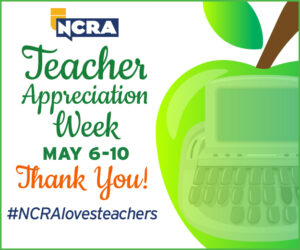
Practicing, staying motivated, meeting target speeds. Networking, handing out résumés, taking skills tests. Court reporting students have a lot on their minds. And getting ready to graduate adds another whole dimension to school life. Students reflect on the challenges they are leaving behind and look forward to the opportunities that lie ahead.
Attending a court reporting program can sometimes be a lonely road, but students find the camaraderie of their classmates to be a good source of motivation. “The most difficult thing about being in school,” explains Sara Simoni, a student at Bryan University in Tempe, Ariz., “is that the people in your circle don’t quite understand what you’re going through. Even though you may explain what it’s like time and time again, they will never quite understand.” Perhaps friends and family may not be able to relate, but nearly 40 percent of students answering a poll in April’s issue of Up-to-Speed reported that their court reporting classmates are “a great source of inspiration.”
Ask just about any court reporting student what his or her biggest hurdle in school is and the answer is usually speed plateaus. Most students also agree on the way to overcome that hurdle: Put in more practice time. Students differ on the details, however. “Maybe instead of writing at only 20 wpm above my goal speed for 5+ minutes, I do short bursts of 40 or 60 wpm over,” says Lauren Mancusi, a student at the College of Court Reporting in Valparaiso, Ind.
Simoni takes the opposite approach. “I would take a one-minute exercise and work it 20 wpm below my target speed … then bump it up in increments of 10 all the way up to 20 wpm above my target speed.’
Of course, there is more to staying motivated than just getting over speed plateaus. “The best tip for getting though school is to forget the bad days,” suggests Celeste Poppe, a recent graduate from Bryan University. “Cry for only an hour, and move on and keep going. It’s hard not to get swallowed up by the ‘I’m not getting it’ or ‘I’m stuck’ feelings, but you just have to keep your eyes on what’s in front of you and keep on stenoing.”
Simoni also says to focus on the positive. “The best tip for surviving school is to remember to reward yourself for even the smallest accomplishment. With all the tests you will fail during your court reporting school journey, you have to take time to celebrate even the smallest achievements.”
Focusing on the positive also means looking to the future. One of the best ways to get a jumpstart on a career is to start earning certifications, like the Registered Professional Reporter (RPR) or the Certified Shorthand Reporter (CSR), while still in school. The experience of regular testing, in addition to the wide range of resources available in the school environment, makes this the perfect time to take those tests. “I am currently a licensed California CSR and working as a freelance deposition reporter. I also obtained my RPR during the time I was waiting for my CA CSR results, having passed each leg on the first time starting with the 225 leg and ending with the Written Knowledge Test leg,” said Poppe. Simoni found her internship to be an invaluable experience in preparing for her certification. “I loved interning. I had friends who were officials at my local courthouse. They couldn’t wait for me to start my interning journey, and they placed me right in on a jury trial. It definitely uplifted my confidence as well. I remember passing one of my last 225 tests right after interning.” She is planning to begin her RPR testing as soon as possible.
Those last few months of school are also the best time to search for a job. Students suggest getting out of the classroom and into the courtroom. “I am currently job hunting!” Simoni announces. “I am handing out résumés, and I am sitting in court with my friends who are officials. I’m working on my professional wardrobe and trying to gather all the necessary things to help me succeed as a new reporter. I know networking is huge in our industry, and I can’t help but be overly excited to hand out my new business cards!” Mancusi and Poppe also recommend attending state association conventions and seminars as a way to network with working reporters who can connect them with jobs.
For some students, the last piece of the puzzle is graduating from court reporting school. Every student takes a different path through the wickets of dictation, speed tests, internships, and graduation requirements. Often, the trickiest thing about graduating may actually be the timing. “To me,” admits Mancusi, “the hardest part of being in school is trying to explain to others why I don’t know my exact graduation date.” When Up-to-Speed polled readers about how important it is for them to graduate from court reporting school quickly, about 34 percent replied that they had people depending on them to graduate as soon as possible. But an almost equal number responded that they had “set a goal to graduate by a certain date, but things may change.” The remaining students were split almost evenly between a determination to graduate by a certain date “no matter what” and the more laid-back approach of “I’m in no rush. It will come when it comes.” Lauren Mancusi is firmly in the “no matter what” camp: “A comfort zone is a beautiful place, but nothing ever grows there.”








